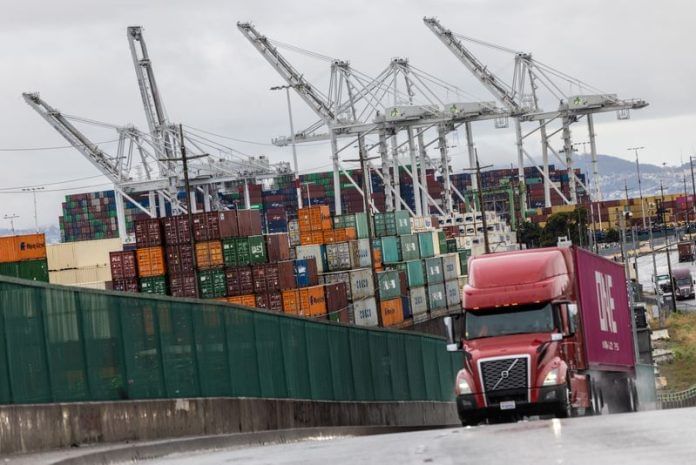By David Shepardson and David Lawder
WASHINGTON (Reuters) -U.S. President Donald Trump on Thursday unveiled sweeping new import tariffs, including 100% duties on patented drugs and 25% levies on heavy-duty trucks starting next week, triggering fresh trade uncertainty after a period of comparative calm.
The latest salvo, which Trump said was to protect the U.S. manufacturing industry and national security, follows wide-ranging duties on trading partners of up to 50% and other targeted levies on imported products such as steel and autos.
Trump’s announcement on Truth Social of the steep duties that go into effect on Wednesday shattered a relative lull in his tariff assault on global trading partners, throwing new obstacles at businesses already struggling with disrupted supply chains, soaring costs and consumer uncertainty.
His new duties included a 50% tariff on imported kitchen cabinets and bathroom vanities, as well as a 30% levy on upholstered furniture, raising costs for a core consumer sector.
The barrage has cast a pall over global growth, while the Federal Reserve has said it is also contributing to higher U.S. consumer prices.
QUESTIONS OVER TRADE DEAL CAPS
Trump’s administration pressed forward over the summer with trade deals to ease tariffs for some key partners, including Japan, the European Union and South Korea.
Questions swirled on Friday whether these would protect countries from the higher sectoral tariffs.
A White House official said the administration would honor 15% caps on tariffs for imported pharmaceuticals under patent for countries with trade deals that specified such reductions.
Deals with the EU and Japan specify protections for drugs, semiconductors and autos, but no documents have been issued for a South Korean trade deal, leaving its cars still subject to a 27.5% total U.S. tariff.
Sources familiar with Trump’s tariff plans said that Britain’s trade deal with the U.S. would not shield U.K. branded drugs from the new 100% duty. A U.S.-U.K. trade deal reached in May for a 10% base tariff rate left pharma tariffs to future negotiations, and British officials were pushing for reductions.
There were no explicit trade deal provisions to cap tariffs for heavy trucks or furniture for any trading partners.
The latest tariffs fall under the “Section 232” national security trade statute, part of Trump’s shift to rely on more established trade laws. The Supreme Court is due to rule on the legality of his broader “reciprocal” tariffs, which two lower courts have struck down.
U.S. and European pharmaceutical stocks mostly held firm after Trump’s announcement, but U.S. stocks were largely flat amid mixed data showing higher inflation and stronger-than-expected consumer spending.
BMO Economics said in a note that investors appeared to be largely shrugging off the latest Trump tariff, adding: “Until the U.S. economy shows more signs of stress from the trade war, investors seem content to keep calm and carry on.”
Claudio Feltrin, chairman of Italian furniture industry association FederlegnoArredo, said he feared the tariffs could trigger a flood of imports from China and other exporters seeking alternative markets.
DRUGMAKERS HAVE BEEN BRACING FOR TARIFFS
Trump said the 100% tariff on branded drugs would only apply to producers that had not already broken ground on U.S. manufacturing plants.
Many drugmakers have announced multibillion-dollar investments in the United States, and Switzerland’s Roche underlined on Friday that one of its U.S. units recently started work on a new facility.
Rival Novartis, which has also made a large U.S. investment pledge, did not reply to a request for comment.
Trump had long threatened higher tariffs on drugmakers, and Ireland, where mainly American-owned pharmaceutical factories employ about 2% of the workforce, has frontloaded exports to the U.S. in anticipation.
Exports of chemical and related products, including medicinal and pharmaceutical products, leapt 536% year-on-year to 23.9 billion euros ($27.9 billion) in the first seven months of 2025, according to Ireland’s Central Statistics Office.
More than half of the $85.6 billion in ingredients for medicines used in the U.S. are manufactured domestically, with the remainder from Europe and other U.S. allies, the U.S. pharmaceutical trade group said earlier this year.
About 60% of the $25.5 billion in U.S. furniture imports in 2024 came from Vietnam and China, according to Furniture Today, a trade publication.
“Many of our members were shocked when we heard the news. I think the decision on the additional tariff is unfair,” said Nguyen Thi Thu Hoai from the Wood and Handicraft Association of Dong Nai province, one of Vietnam’s largest furniture clusters.
Furniture and wood products manufacturing employment in the U.S. has halved since 2000 to around 340,000 today, according to government statistics.
Higher tariffs on commercial vehicles could put pressure on transportation costs just as Trump has vowed to reduce inflation, especially on consumer goods such as groceries.
Trump said the new heavy-duty truck tariffs would benefit companies such as Paccar-owned Peterbilt and Kenworth and Freightliner.
Shares of German truck makers Daimler Truck and Traton fell on news of the levies.
($1 = 0.8562 euros)
(Reporting by Ismail Shakil, David Shepardson and David Lawder in Washington, Rocky Swift and Kantaro Komiya in Tokyo, Khanh Vu and Francesco Guarascio in Hanoi, Philip Blenkinsop in Brussels, and Julia Payne in London. Writing by David Shephardson, John Geddie and Charlie Devereux and David Lawder. Editing by Caitlin Webber, Lincoln Feast, Mark Potter, Toby Chopra and Cynthia Osterman)
Disclaimer: This report is auto generated from the Reuters news service. ThePrint holds no responsibility for its content.





